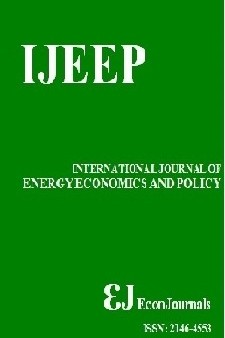China’s Economic Growth and Energy Consumption
China’s Economic Growth and Energy Consumption
- Başlangıç: 2011
- Yayıncı: İlhan ÖZTÜRK
Kamolwan Deeswasmongkol, Naraphorn Haphuriwat Paoprasert
Bounds Testing Approach to Analyze the Existence of an Environmental Kuznets Curve in Ecuador
Manuel A. Zambrano-Monserrate, Freddy F. García–Albán, Kliffer A. Henk-Vera
The Effect of Crude Oil Price Moments on Socially Responsible Firms in Eurozone
Nikolaos Sariannidis, Grigoris Giannarakis, Eleni Zafeiriou, Ioannis Billias
Gianpaolo Iazzolino, Rossella Gabriele
Antonio Angelo Romano, Giuseppe Scandurra, Alfonso Carfora
Estimation of Economic Efficiency of Energy Security Strategy: The Case of Japan
Natalia Alexandrovna Vorobeva, Mikhail Vladimirovich Kolesnikov
The Asymmetric Effects of Oil Price Shocks on the Canadian Economy
Luiggi Donayre, Neil A. Wilmot
Mihail Nikolaevich Dudin, Nikolaj Vasilevich Lyasnikov, Vladimir Dmitriyevich Sekerin, Anna Evgenevna Gorohova, Vyacheslav Viktorovich Burlakov
